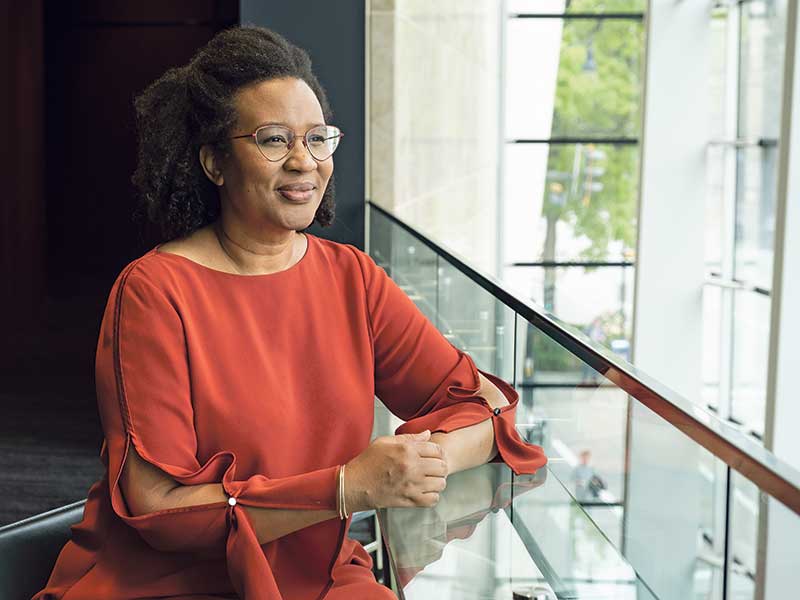
This article appears in the Mid-October 2022 issue of Investment Executive. Subscribe to the print edition, read the digital edition or read the articles online.
Sometimes clients get stuck on financial problems that math just can’t solve.
In such cases, certified financial planner Natasha Knox takes a behavioural approach to helping clients. Knox is the founder of Alaphia Financial Wellness, which is based in the Greater Vancouver Area but serves clients across Canada.
Knox also holds the trust and estate practitioner designation, as well as the certified financial behaviour specialist designation, a credential conferred by Tennessee-based Financial Psychology Institute that qualifies her to incorporate financial therapy for clients who want it. And, she said, most of them do.
Financial therapy is a term defined by the Financial Therapy Association as “a process informed by both therapeutic and financial competencies that help people think, feel, communicate and behave differently with money to improve overall well-being through evidence-based practices and interventions.”
While Knox uses financial therapy in her practice, she said, she’s not a therapist herself. Instead, she relies heavily on coaching to help guide behavioural changes in her clients. She uses financial therapy primarily to create awareness.
“My clients are wanting something more than just numbers crunched,” Knox said, “because they tend to be fairly numerate and have a certain baseline of financial literacy.”
The piece that’s missing is the way finances show up in their emotions, behaviours and relationships with others, she said.
As a result, Knox might work more intensely with clients from the outset than traditional financial planners do. For example, clients might see her four to six times in the first two months while they’re trying to effect a behavioural change. The cadence of these meetings is set by the client, she said.
For example, a client may regret a past investment decision and is now sitting on the sidelines out of fear. Other times, a client may want to create an estate plan but is not sure how to handle decisions regarding their adult children.
In these instances, “there’s a pain point that can’t be solved with math,” Knox said.
To help clients get past these sticking points, Knox helps them articulate the origins of some of their money beliefs.
Sometimes clients have ideas about money that they believe to be universal truths. Yet, those ideas have been shaped by their background, their experiences, what they’ve read and other influences, Knox said. Identifying those beliefs is the first step toward figuring out what a client’s ideal future might look like.
While not every financial advisor can and should take the approach Knox does, she believes the industry would radically change if advisors had the opportunity to explore how their personal background affects their approach to finance.
“Everyone has a money story. Everyone has a different way that they grew up around money. Everyone has beliefs around how it should be used,” Knox said. “All of that history and all those beliefs show up in our work with clients.”
Developing that self-awareness can help financial professionals listen to and understand clients without judgment. Without that awareness, there’s an increased chance of shame or frustration for clients, who may in turn hide important information.
Knox launched Alaphia Financial Wellness (formerly Pax Financial Planning and Education) in March 2018. She began in the business as a financial security advisor with Freedom 55 Financial, where she worked for almost 14 years.
When Knox struck out on her own, she chose the advice-only business model. The name Alaphia is inspired by the Yoruba word “alaafia,” which means peace. “It ties into what I’m trying to help people achieve, which is a sense of peace with respect to their finances,” she said.
For Knox’s clients, this sense of peace could mean knowing that their values are in alignment with how they’re managing their money and figuring out how much is enough, she said. It can also mean letting go of the guilt they feel about past behaviours and the shame they may have about their level of wealth.
After starting her business, Knox explored several growth ideas to see which strategies would work. For example, she said using Google Ads was an expensive mistake because the people who responded weren’t a fit for her type of approach.
What has been more effective is getting her name in association directories to reach new audiences. Some of these placements require payment, while others are free.
Revamping her website, which took a few attempts, also made a difference in drawing in the type of clients she feels would most benefit from her approach: younger Generation X and older millennial professionals. Knox said her site’s visuals now reflect her branding and the copy reflects her personality and values.
Knox attended Simon Fraser University in Burnaby, B.C. , where she majored in English literature. Before joining Freedom 55 in her late 20s, she was self-employed as a resumé writer working mostly with executives. “It was both gratifying and emotional work,” she said. Clients would share their aspirations and fears, similarly to how they do in her financial planning practice.
One of Knox’s core values is to be generous with her time and her expertise. She hosts the Financial Friday Happy Hour, which takes place on Zoom every Friday at 8 p.m. eastern time. The event serves as a virtual open house in which anyone, from professionals to prospective clients, can hop on to pick her brain, discuss research and professional collaboration, learn about financial therapy or just take the opportunity to make a connection.
“Sometimes when there is a mix of people on the call, it’s a bit of a free-form conversation around money,” Knox said, “and it’s really nice to be able to provide a space for people to safely have those conversations.